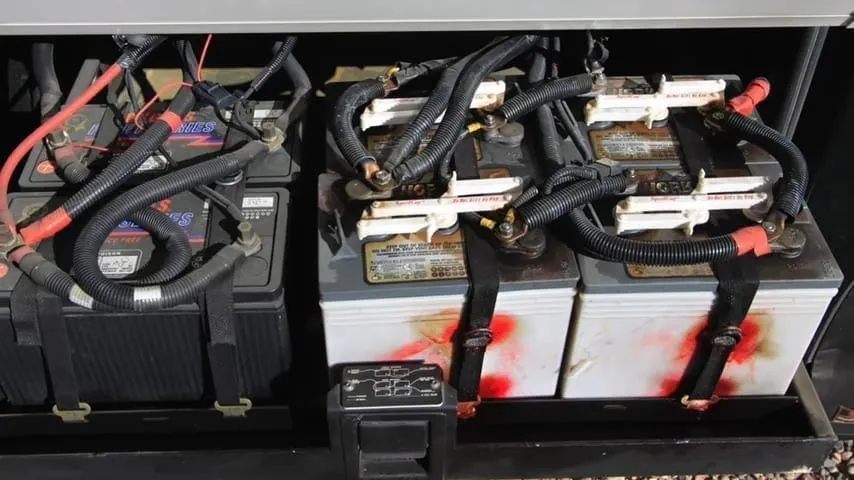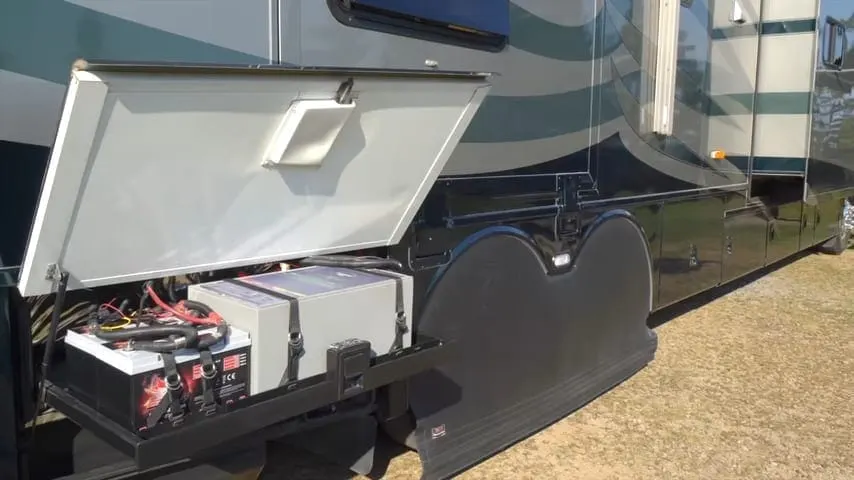One of RVing’s most common questions, particularly from those considering off-grid camping, is “Are RV Lithium Batteries worth it?”
Even experienced RVers have had a tough time determining whether the investment will pay off.
“Should I just stick with the lead-acid batteries that came with the rig, or will it be a meaningful upgrade to move to lithium, and worth the time and expense?”
Though it can seem a bit overwhelming when contemplating the options, it doesn’t have to be as difficult as it may appear. Let’s have a look at the value of lithium batteries as compared to the lead-acid batteries with which you’re likely more familiar.
What are RV Lithium Batteries?
Simply put, RV Lithium Batteries are rechargeable 12-volt batteries that have become a popular replacement for lead-acid batteries. This is particularly true of folks who have solar power on their rigs.
RV lithium batteries are based on a newer, more efficient lithium-ion technology known as LiFePO4 or lithium iron phosphate. For the purposes of this post, whenever we talk about “lithium” we’re referring to this specific technology.
Difference Between RV Lithium Batteries and Lead Acid Batteries

Lead-acid batteries are less efficient, heavier, and have a shorter lifespan than lithium batteries.
Aside from the technology on the inside, the difference between lithium batteries and lead-acid batteries essentially boils down to the efficiency of use and lifespan.
Lithium batteries can be fully discharged without damage. But once a lead-acid battery is discharged below 50 percent, it suffers permanent damage and will no longer recharge to its full capacity. Because lithium batteries can safely be fully discharged without damage (so their rated capacity is fully usable) a lithium battery provides much more usable amp hours than a lead-acid battery rated at the same capacity… about double!
While a 100-amp-hour lead-acid battery can only safely be discharged to roughly 50 percent, a 100-amp-hour lithium battery can be depleted to virtually zero without damage. So, you only get about half as many usable amp hours from lead-acid as you do with lithium.

An RV lithium battery can be depleted and recharged thousands of times.
An RV lithium battery can also be depleted and recharged (or cycled) thousands of times. Lead-acid batteries may only have as few as several hundred cycles in them before needing to be replaced.
Additionally, lithium batteries are much lighter than lead-acid batteries, which can be a huge help for RVs that are at or near their maximum weight carrying capacity. And because it takes fewer batteries to equal the same amount of usable amp-hours, lithium batteries ultimately use less space than their lead-acid counterparts (again, a big benefit for smaller RVs that need more power but don’t have the room to add more batteries)
Price of RV Lithium Batteries
We won’t deny that lithium batteries are significantly more expensive to purchase than lead-acid batteries. The current (pun intended!) typical average cost of a 100 Ah RV lithium battery can be somewhere around $1,000, which is many times the cost of a similarly-rated lead-acid battery.
However, when you consider that lead-acid batteries are likely going to need to be replaced much more often, lithium batteries can cost less over time.
It’s also important to consider the charging time saved. Lithium batteries will charge more quickly and more efficiently, so you’ll also save fuel that might otherwise be required to run your generator. You may even save time and the hassle of seeking a sunny spot for your solar charging when you know you’ll be able to rely on the power of your lithium batteries for longer.
Plus there’s no more “battery anxiety” with lithium batteries. Lead-acid batteries need to be handled fairly delicately when it comes to discharging since you can’t exceed 50% of their rated capacity. So that can lead to recharging them more often, just to avoid exceeding that limit. With lithium batteries, an amp is an amp is an amp. Doesn’t matter if the battery is at 100% charge, or 39%. They just provide power. And as long as you have the number of amp-hours you need to make it through the night… you’re good!
Myths About RV Lithium Batteries
- “They’re dangerous!”
There was a time when the lithium batteries used in various electronics could overheat and even catch fire. That is no longer the case. As with anything, the technology has advanced, leading to RV lithium batteries made with LiFePO4 (lithium iron phosphate) technology. LiFePO4 utilizes a non-combustible lithium solution. - “They can’t be used in cold weather!”
Depending on the brand, you can draw power from an RV lithium battery down to -4 degrees F. As far as charging goes, some lithium batteries are now available with heating elements built in, so they can be charged even when it’s far below freezing. And because they don’t produce flammable gas while being recharged (which is why flooded lead-acid batteries are installed in vented exterior compartments), you can install lithium batteries inside, where they’re insulated from cold outside temps. - “They’re more expensive!”
Lithium batteries do cost more when initially purchased. It’s also true that they last so much longer than lead-acid batteries, they can actually be less expensive in the long run. A single lithium battery typically lasts at least ten times longer than its lead-acid counterpart. So, if you intend to keep your rig for a reasonable length of time, the investment will almost certainly pay off.
Benefits of Lithium RV Batteries
There are numerous benefits to using lithium RV batteries. As we’ve talked about, they can handle deeper cycling than lead-acid batteries without suffering damage. The life span of lithium batteries is significantly longer than that of lead-acid batteries. And lithium batteries are lighter in weight and take up less space than traditional lead-acid batteries.

Lithium batteries charge faster than lead-acid batteries.
The fact that lithium batteries recharge faster than lead-acid batteries is a tremendous advantage, particularly for solar applications. Additionally, if you use a generator to recharge your lithium batteries, you’ll have to spend less time (and therefore less fuel) running your generator.
Another huge benefit that’s rarely mentioned is that you don’t need to bring a lithium battery to a full charge every time you charge it. You’ll occasionally want to give your lithium batteries a full charge to help restore their full capacity, but it’s preferable to partially charge a lithium battery the majority of the time, which is ideal for solar applications. AND it helps eliminate the “battery anxiety” that comes with worrying about your lead-acid batteries’ state of charge!
And finally, lithium batteries require no active maintenance. They have a battery management system that monitors their health, while even a sealed lead-acid battery requires careful monitoring of depth of discharge to try to maximize its lifespan.
Are Lithium RV Batteries Worth It?
Whether or not RV lithium batteries are worth the investment for you really depends on how you intend to use your RV. For RVers who prefer the luxuries of an RV park and who are generally hooked up to shore power, chances are lithium batteries won’t pay off for you. But for those of us who prefer to camp off the grid as much as possible, lithium batteries will pay off over time, both in terms of dollars, and in user satisfaction.
If you’re unsure which type of battery is right for you, watch the presentation we gave at the annual Xscapers Bash. We discuss the pros and cons of each type of battery (flooded lead-acid, AGM, and lithium), which may help you decide which way to go.
Still Not Sure & Want To Learn More?
Want even more information? Check out Tom Morton’s detailed dive into all three common battery types: flooded lead acid, AGM, and lithium. He tests them all to determine what battery chemistry/type really is the best for the money.
???? Or if reading is more your style, check out his detailed post on the same topic.
Conclusion
RV lithium batteries use relatively new technology, but they significantly improve the quality of RV life, particularly for boondockers. Luckily, as more and more people gravitate toward the use of lithium batteries, prices will continue to come down.
RV lithium batteries can certainly be a worthwhile investment to enhance your comfort as you enjoy camping and recreating in the great outdoors. Don’t immediately dismiss the idea of installing them
Geek Out with Us Every Week
Join our newsletter to learn about all things RV-related. Every week we offer free tips, tricks, product reviews, and more to our online community of RVers. Whether this is your first time on the road or you’re a seasoned expert, we’d love for you to geek out with us!


BL Armstrong
Thursday 10th of March 2022
I’m a newbie to RVing and just bought a 2013 fifth wheel. The lead acid battery in the trailer was old and since I will be off grid (purchasing a generator) I’ve purchased a LiFePO4 battery to drop into the trailer.I’m confused now if the converter/charger in the rig can charge and convert the lithium battery. Do I have to upgrade/replace the old converter to work with the lithium battery? I thought I could just swap out the lead acid. Any direction would be helpful. Thank you
BL Armstrong
Friday 11th of March 2022
Thank you
TheRVgeeks
Thursday 10th of March 2022
Hi BL. You definitely have to check to be sure your other electrical components are Lithium compatible... in this case, your converter/charger (if you have solar, you'll also have to check your solar charge controller, etc). Find the make & model on your converter/charger and check with the manufacturer. It will likely need to be configured to switch to Lithium-compatible mode... or be replaced.
Unfortunately, too many Lithium battery manufacturers like to gloss over that compatibility issue and market themselves as "drop-in replacements" for flooded lead-acid batteries. While they may match the dimensions, making them an easy PHYSICAL switch out, their electrical/charging properties are different enough to cause problems.
David S
Saturday 12th of February 2022
Has anyone tried Specialized Power Systems 24 Volt Batteries. I read some amazing reviews on DIY solar but was not sure how they worked with RV. Their 4 x 24V 100Ah combo for $3450 is what I'm considering. Any feedback would be appreciated
TheRVgeeks
Sunday 13th of February 2022
Hmmmm, David. Not familiar with Specialized Power Systems... but there are a lot of new brands out there! The only thing we CAN tell you is that going with a 24V system will likely require the replacement of other system components that may not be compatible with a 24V battery bank. And you'll need a 24V-to-12V converter for the existing systems to work... since they won't be able to natively handle the 24V battery.
Megan O ONeill
Tuesday 1st of February 2022
I bought a 100-ah lithium battery about 6 months ago and so far, really see the advantages. I could only afford one at the time and will want to purchase another this year (am finding out it is more about the batteries in power!). My question is do I have to buy the same make/model as the first one or can I go to a different brand?
TheRVgeeks
Tuesday 1st of February 2022
Good question, Megan. While, technically, you don't HAVE to get two of the same brand, there are reasons why you'd probably want to. Even with Lithium batteries, there can be differences in the exact voltages needed for charging... so having them match ensures they behave the same. Mixing-and-matching could lead to some odd behavior with one battery dropping out before the other, etc. So we'd suggest it's probably best to keep things consistent.
Richard Hubert
Friday 5th of March 2021
I cannot say enough good things about LiFePO4 batteries since upgrading to them 1 1/2 years ago in our Winnebago Class A. Yes - they do cost more, but I was getting so frustrated trying to charge up and get decent (usable) power out of my 4 6v Trojan FLA's.
Not only do we now have all the benefits mentioned above, but we found there are additional savings from having Lithium batteries -
While we have good solar - we still have to run the generator on cloudy/rainy days and when parked under trees. But we found that by having Lithium that we can run the gen far less since the Lithium batteries take a charge so much faster. Really enabled our boondocking capabilities!! Now we have 400ah of Lithium batteries, so we have lots more usable power available. Before we felt that we often had to go into RV parks in order to be able to plug into shore power because our FLA batteries just were not doing the job of supplying all the power we wanted. So we were spending a lot more on RV Parks than we wanted. Now - we almost never stay in RV parks, preferring to stay for free (mostly) on BLM land, Forest Service CGs, Boondockers Welcome, Indian Casinos and Harvest Hosts. And - we are not only saving a lot of $$ by not staying in RV parks, but these boondocking capabilities have enabled us to go and stay in so many other, extremely scenic places!TheRVgeeks
Friday 5th of March 2021
All excellent points Richard, and mirrors our experience precisely. So happy to hear that you’re having the same sort of qualify of life improvements we are.
David Bowen
Friday 5th of March 2021
It's like you have been looking over my shoulder all week as I immerse myself in all things RV solar. We ordered a new trailer last week and opted for the 110v/12v fridge with solar package. We plan to add boondocking to our camping experience. I knew the delivered battery would not be sufficient so have been doing all kinds of research. Over and over, I have found lithiums are the way to go and they are the cheapest over the long run. Will be swapping out the 1 AGM for 2 Battle Borns and adding a 2nd roof panel. Based on my load evaluation, we should be good! The timely article from folks I follow and trust was perfect!
TheRVgeeks
Friday 5th of March 2021
So great to hear, David! And yes… We are watching. ????